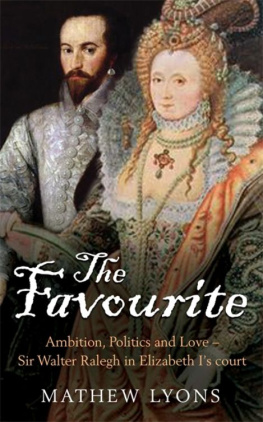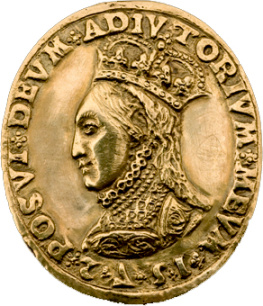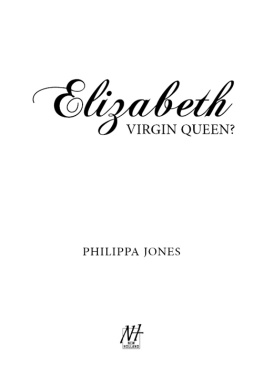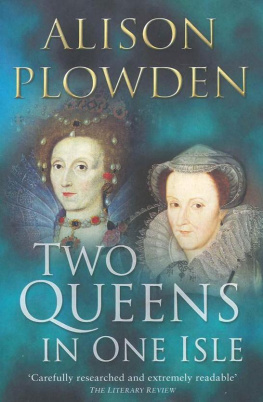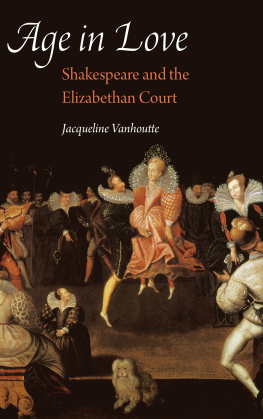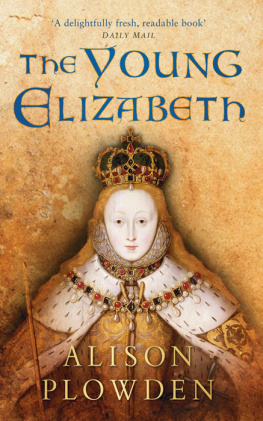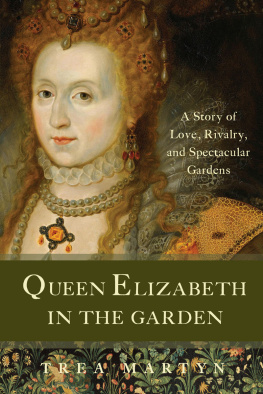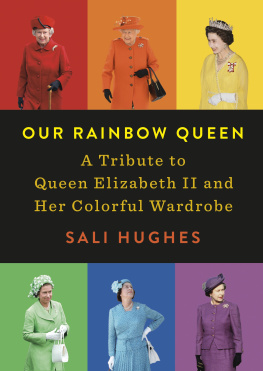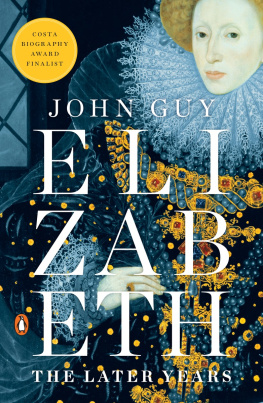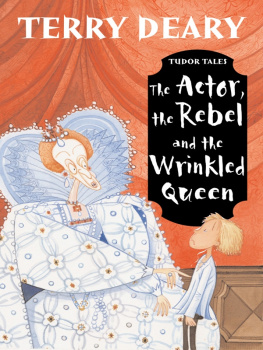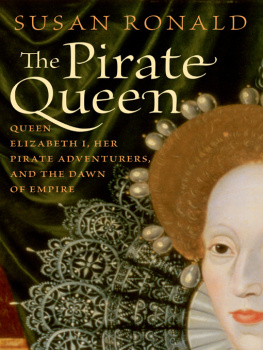Queen of England Elizabeth I - The favourite: Sir Walter and his queen
Here you can read online Queen of England Elizabeth I - The favourite: Sir Walter and his queen full text of the book (entire story) in english for free. Download pdf and epub, get meaning, cover and reviews about this ebook. City: Great Britain;England, year: 2012;2011, publisher: Constable & Robinson, genre: Non-fiction. Description of the work, (preface) as well as reviews are available. Best literature library LitArk.com created for fans of good reading and offers a wide selection of genres:
Romance novel
Science fiction
Adventure
Detective
Science
History
Home and family
Prose
Art
Politics
Computer
Non-fiction
Religion
Business
Children
Humor
Choose a favorite category and find really read worthwhile books. Enjoy immersion in the world of imagination, feel the emotions of the characters or learn something new for yourself, make an fascinating discovery.
- Book:The favourite: Sir Walter and his queen
- Author:
- Publisher:Constable & Robinson
- Genre:
- Year:2012;2011
- City:Great Britain;England
- Rating:3 / 5
- Favourites:Add to favourites
- Your mark:
- 60
- 1
- 2
- 3
- 4
- 5
The favourite: Sir Walter and his queen: summary, description and annotation
We offer to read an annotation, description, summary or preface (depends on what the author of the book "The favourite: Sir Walter and his queen" wrote himself). If you haven't found the necessary information about the book — write in the comments, we will try to find it.
Queen of England Elizabeth I: author's other books
Who wrote The favourite: Sir Walter and his queen? Find out the surname, the name of the author of the book and a list of all author's works by series.
The favourite: Sir Walter and his queen — read online for free the complete book (whole text) full work
Below is the text of the book, divided by pages. System saving the place of the last page read, allows you to conveniently read the book "The favourite: Sir Walter and his queen" online for free, without having to search again every time where you left off. Put a bookmark, and you can go to the page where you finished reading at any time.
Font size:
Interval:
Bookmark:
For my father, John, and to the memory of my mother, Molly, with gratitude and love
Two people above all have helped make this book what it is. Leo Hollis at Constable & Robinson has been everything a writer could wish for in an editor: patient and supportive, incisive and insightful, encouraging, rigorous and enthusiastic. My agent, Sarah Such, has nurtured this project to completion from the first tentative and unshaped conversations, always wise in her judgement and acute in her analysis and infallible in her advice.
On a personal level, first among all things to praise and give thanks for are my wife Helen who has carried too much of the burden of this books writing and to whose love and faith I owe more than she can know and our children Isaac and Evie, who illuminate and warm all things in our lives with their boundless love, quizzical intelligence and quiet sarcasm.
I would also like to say a public thank-you to Alice Burden, Mike Dee, Julia Posen, Sue Sands, and Karl and Jane Woolley, for their great kindness, generosity and support for our family during 2010. I am grateful too to Sarah Elvins and Jane Housham, Catriona Jardine, and Richard Siddle for helping sustain my career during the writing of this book, and to David Barraclough and Jenny Boyce, Kes Fielding and Jane Hodgson, and George Osborne and Lois Rogers for their hospitality and friendship.
The staff at the British Library, as always, have been unfailingly and unflappably helpful; I am immensely grateful to them. I would also like to thank Nicola Jeanes and Emily Burns at Constable & Robinson, together with my copy-editor Sophie Hutton-Squire, for their work on my behalf.
Note: Although I rather like the vigour, invention and variety of 16th-century spelling, I felt that on balance clarity was a greater virtue and I have therefore modernized spelling where required. There is no better illustration of the need for such standardization than the fact that William Stebbing, Raleghs best Victorian biographer, logged 74 variant spellings of his surname. Although I have retained one or two other spellings in source material as a nod to such profusion, elsewhere I have standardized on that preferred by Ralegh himself.
But when I found my self to you was true
I lovd my self, because my self lovd you.
Sir Walter Ralegh
Minions are not so happy as vulgar judgements think them,being frequently commanded to uncomely,and sometimes unnatural employments.
Sir Walter Ralegh
It was a cool spring morning and Elizabeth was at Greenwich Palace. She had been born here, like her father before her; it was her favourite place. The palace was built on the south side of the river just where the Thames loops down into Kent before returning to its eastward path to the sea; behind the turrets and gables of its brick river front lay courtyards and towers, gardens and park. When the court sat here, which was often, the great and lesser ships leaving Londons quaysides for the Americas and the other unknown limits of the world were known to salute their passing with the smoke and roar of their guns, drawing courtiers and councillors alike to the palace windows. River traffic to and from the city to the west was brisk.
This particular morning Elizabeth was enjoying the small and precious liberty of a walk in the palace park. The wide silver-grey river was rough and unsettled; curlews flecked the shore. Green fields could be seen to the south through a gate in the park wall, pastures rising quickly out of the valley, studded with poplars; to the east, the palace meadow gave way to green marshland. As she walked, Elizabeth perhaps talked with the small coterie of men and women gathered about her. She was no doubt lightly guarded, if at all, since she viewed such securities as an unnecessary evil or rather, as a malignant affront to her freedom, no matter their necessity. But she walked quickly, nonetheless.
And then she stopped, and the illusion of free movement, of liberty, faded. In front of her the path gave way to thick wetmud. She looked around at her courtiers, imperious and expectant. They did not move and the moment filled with uncertainty and silence. Then a tall young man stepped forward. She must have known him a little: through his family, his reputation at court, through talk of his exploits elsewhere. He was Ralegh, a West Countryman, a seaman and a soldier. She perhaps noted he was richly dressed, far beyond his status or his means. But then he swept off that sumptuous cape of his and, bowing low, laid it over the cold, wet mud at her feet. He had, surely, something graceful and witty to say to mark this small gift. She walked on over the cape, and looked at him again and wondered
This book is about that moment: Ralegh stepping forward from the obscurity of his youth, stepping out into historys glare, and Elizabeths wonder at him, his promise, his gifts. But while the story of the cloak itself is mostly a confection whatever truth it holds, it has little to say about Raleghs claims on his queen the true story of their coming together is quite different and altogether more compelling, fraught with dangers for both of them. The Favourite does what has not been done before and traces Raleghs rise to favour over several perilous years from which he was fortunate to emerge both alive and free. It examines anew the personal and political compulsions that drew them together, and then tracks the careful steps of their dance as Elizabeth negotiated, Ralegh at her side, the darkest years of her reign, overshadowed by the fear of conspiracy, assassination and war.
It is here that Raleghs cloak, casually thrown down to stop Elizabeth soiling her shoes in the dirt, becomes a problem. After all, if you know one thing about Ralegh and Elizabeth, it is this story, or a version of it. It has seeped out from its place in anecdotal Tudor history into the popular consciousness, becoming an iconic image that seems wholly to articulate the strange and elaborate rituals of deference and favour that existed between a queen and her courtier, a parable of ambition, subjugation and power.
In the process, the personalities of Ralegh and Elizabeth, no less than the physical and emotional drama and drive of their relationship, have blurred. We recognize the shape of their poses, and think no further. The very ubiquity of the story contrives to give their relationship a sense of inevitability, so that we do not stop to examine either it or them on their own terms: how their individual trajectories brought them together and what it was about their own experiences and understanding of the world that made each attractive to the other.
We do not even stop to ask what kind of attraction it was that they felt. We feel glibly assured that money, sex and power were present in some measure, but we do not consider how difficult it might have been to establish and sustain a meaningful relationship with such potent and conflicting motives ever-present, nor really what such a relationship might mean in the context of a queen regnant and a minor courtier in a late Tudor court. How could any private bond form in such a relentlessly public forum? What reality could the intense, passionate and playful rhetoric of love which both employed actually describe? Where was the human truth in the complex negotiations with power that court life inevitably imposed on them?
These questions are at the heart of The Favourite. If it is a book about Ralegh and his extraordinary rise to power, then it is also about Elizabeths struggle for personal liberty against the immense constraints of her position. Above all, in writing this book, I wanted to acknowledge, even celebrate, the ordinary contradictions of these two exceptional people, to rescue them from their own myths, restore to them some of the freedom for which they both so desperately and differently yearned.
Font size:
Interval:
Bookmark:
Similar books «The favourite: Sir Walter and his queen»
Look at similar books to The favourite: Sir Walter and his queen. We have selected literature similar in name and meaning in the hope of providing readers with more options to find new, interesting, not yet read works.
Discussion, reviews of the book The favourite: Sir Walter and his queen and just readers' own opinions. Leave your comments, write what you think about the work, its meaning or the main characters. Specify what exactly you liked and what you didn't like, and why you think so.

